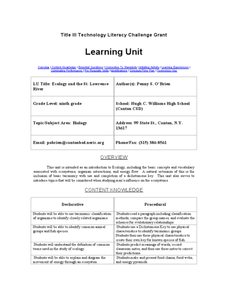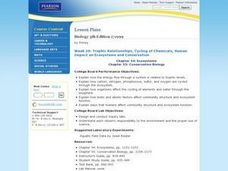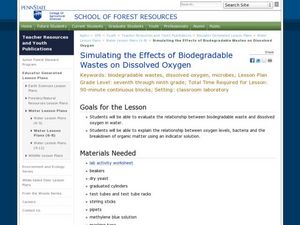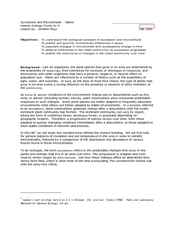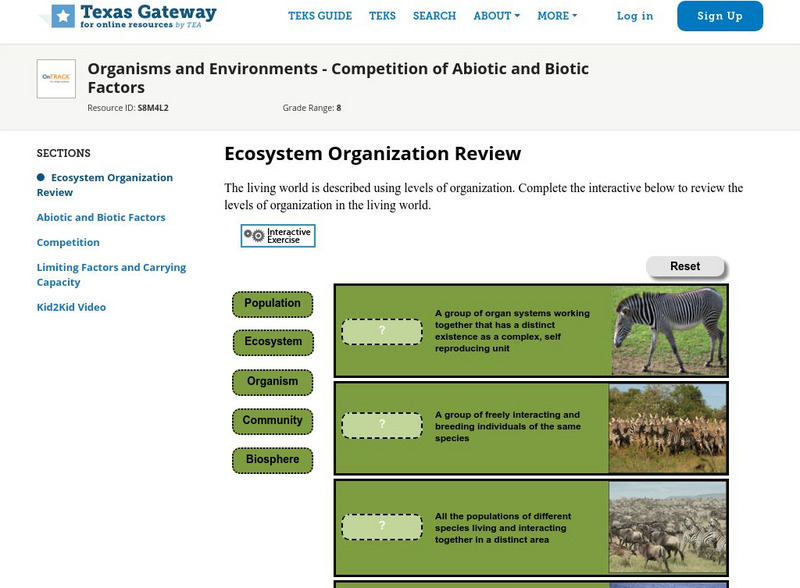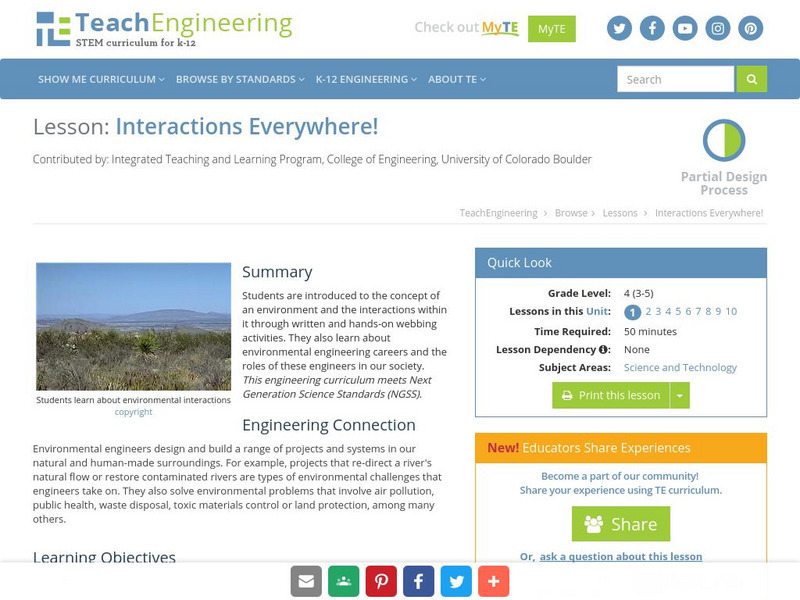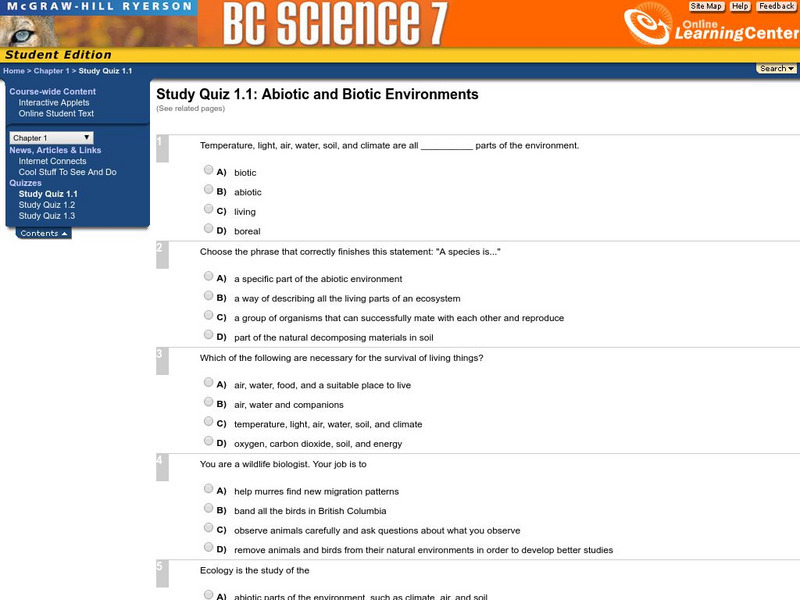Curated OER
Biosphere
Students examine the basic biosphere and its components. In this ecology instructional activity students complete several experiments including designing a system that is balanced to sustain life.
Curated OER
Some Similarities Between the Spread of an Infectious Disease and Population Growth
Learners compare and contrast the spread of infectious diseases and population growth. In this biology lesson plan, students identify the exponential growth pattern of spreading diseases. They relate this to HIV infection and AIDS.
Curated OER
Ecology and the St. Lawrence River
Ninth graders complete a unit of lessons on ecosystems, organism interactions, and energy flow. They create a key for known species of fish, diagram the movement of energy through an ecosystem, and create and present food chains and food...
Curated OER
Trophic Relationships, Cycling of Chemicals, Human Impact on Ecosystems and Conservation
Learners explore how the energy flow through a system is related to trophic levels. They investigate how organisms affect the cycling of elements and water through the biosphere. Students participate in lab activities to observe ways...
Curated OER
Simulating the Effects of Biodegradable Wastes on Dissolved Oxygen
Students evaluate the relationship between biodegradable waste and dissolved oxygen in water. In this biodegradable wastes lesson students complete a lab activity in groups then analyze their results.
Curated OER
What's in Our Woods?
Students observe their local forest and document the change that occurs over the school year. For this forestry lesson, students utilize a GPS to mark a certain area of the woods as their study area for the remainder of the year....
Curated OER
Our World A Complex Eco-system
Sixth graders set up an ecosystem, investigate conservation techniques, develop an action plan for conservation, and various other activities to explore the ecosystem.
Curated OER
Six Levels of Ecological Organization
Ninth graders describe the six levels of ecological organizations and give examples of each. They also differentiate between food chains and webs and identify trophic and consumer levels in food chain and food webs.
Curated OER
Outcomes Science 4: Earth & Beyond
In this earth and beyond science worksheet, students read through 11 pages of information on weather, global warming, climate change and other related topics. There are many website links on the pages that provide additional information...
Curated OER
Succession and Microclimate
Students compare the population of insects in different microclimates. In this biology lesson, students collect data using probes to tabulate temperature and soil data. They predict how certain parameters change as an area goes through...
Curated OER
The Portable Niche
Third graders, in groups, research animals, plants, and conditions found in ecosystems.
Curated OER
Survivor
Seventh graders investigate changes in the ecosystem within the school year. They see that ecosystems, communities, populations, and organisms are dynamic and change over time. They, in groups, collect data in quadrants in the fall,...
Texas Education Agency
Texas Gateway: Competition of Abiotic and Biotic Factors
This tutorial explores abiotic and biotic factors with videos and interactive activities.
TeachEngineering
Teach Engineering: Environmental Interactions
In this activity, students create a "web" to identify and demonstrate the interactions among the living and non-living parts of an environment. This information allows students to better understand what an environment is and to also...
Science Education Resource Center at Carleton College
Serc: Our Big Backyard: How Does Our Local Ecosystem Change During the Year?
Get students observing the environment around their school with this activity. In this lab experiment, students keep a journal containing written observations and digital pictures of how local flora and fauna change during the school year.
Soft Schools
Soft Schools: Biodiversity Quiz (Ecological Problems)
Take an interactive quiz over ecological problems affecting the environment. After completing the quiz, check your score, and then revisit any incorrect question for further review.
TeachEngineering
Teach Engineering: Interactions Everywhere!
This lesson introduces students to the concept of an environment and the interactions within it through written and hands-on webbing activities. The lesson also introduces students to environmental engineering careers and their roles in...
McGraw Hill
Mc Graw Hill Ryerson: Abiotic and Biotic Environments
Take this ten question quiz on abiotic and biotic environments. The quiz is multiple choice.
Other
Hub Pages: Abiotic Factors: A Component of Ecosystem
In the environment, there are external factors that really affect organisms living within it. One of these factors is the set of abiotic factors, or nonliving variables, such as wind, ocean, day length, rainfall, temperature, and ocean...
Texas Instruments
Texas Instruments: Glencoe Middle School Science: Biodiversity and Ecosystems
Students will conduct a field investigation to learn about the environment. They will observe biotic and abiotic factors of an ecosystem. Students can use the CBL 2 and a temperature probe to collect data and a graphing calculator to...
Untamed Science
Untamed Science: Biology: World Biomes: Lakes and Ponds Biome
Learn about the biotic and abiotic factors of lakes and ponds as well as learning how lakes form through reading and video clips.
University of Michigan
University of Michigan: The Concept of the Ecosystem
Lesson looks at the definition of an ecosystem, biogeochemical cycles, and factors responsible for the differences between ecosystems.
Oswego City School District
Regents Prep: Ecosystems/communities
Abiotic factors vary in the environment and determining the types and numbers of organisms that exist in that environment. Factors which determine the types and numbers of organisms of a species in an ecosystem are called limiting...
PBS
Pbs Teachers: Canyonlands: Tonight Our Guest Is
This lesson will help students understand that animals adapt to abiotic and biotic conditions in their environment, some of which have evolved over a long period of time through the process of natural selection, and identify the...




